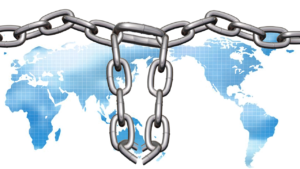In my last post, I wrote that programs are needed in emerging market countries to develop leaders with integrity and vision. David Pugliese reports from Afghanistan on one such program there. The surprising thing is that the program is being run by the Canadian military and not a foreign ministry or non-governmental organization [“Arming Afghans With Good Governance,” Defense News, 25 June 2007].
“Senior Canadian military officers here are combating the Taliban in a unique way: They have been embedded into the Afghan government to advise the Karzai administration on long-term development of the nation. The aim is to win civilian hearts and minds and undercut support for the insurgency. In a first for the Canadian Forces, the military has put together a team of 16 specialists who mentor Afghan leaders in various government departments and help develop long-range strategic policy. The Canadian Strategic Advisory Team (SAT) in Afghanistan is focused on helping bring good governance to the country, a goal that officers believe will provide a payoff in terms of improving public support for the beleaguered Karzai regime. ‘The people of this nation have an option, and that option is good governance,’ said Canadian Air Force Col. Don Dixon, who heads the team.”
As I have previously noted, corrupt officials can undermine any effort to help bring a country out of poverty despite the best intentions and efforts of outsiders. Show me an impoverished country and I’ll show you a system rife with corruption. Corruption is a topic that I addressed a year ago [Corruption, Development-in-a-Box, and Global Resilience]. That situation confronts rebuilding efforts in Afghanistan. Pugliese reports:
“There has been concern among various analysts and international organizations about corruption and incompetence in President Hamid Karzai’s government, hurting support for his administration. A March 15 report by the United Nations secretary-general found that the ‘alienation’ of Afghans — caused by inappropriate government actions, corruption and nepotism — is a key factor behind the revitalized insurgency. ‘The central government’s frequent tolerance of weak governance has diminished public confidence in its responsiveness and its readiness to hold officials accountable for their transgressions,’ according to the 18-page report, titled ‘The Situation in Afghanistan and its Implications for International Peace and Security.’ Some Afghans refer to Karzai as the ‘mayor of Kabul,’ since they do not believe the power of his government extends beyond the capital city.”
Pugliese’s article underscores the importance of having a respected and functioning central government. If the government is incapable of providing the social services expected of it, citizens will look elsewhere for such support. Often they find it from groups whose aim is to undermine the government and seek to come to power themselves. While legitimate political opposition is a healthy thing, opposition that undermines basic governmental infrastructure is not. The kind of shadow support offered by the Canadians is a good way to provide in situ training so that the functions of government are not disrupted while the training is provided.
“The SAT of 14 military officers and two Canadian government workers is focused on helping higher-level officials in the Afghan government, particularly at the ministerial level, in what Dixon calls capacity building — ‘to teach, mentor senior officials in this country on how to run departments and portfolios,’ he said. The team does not advise on military matters, but instead concentrates on governance, rule of law and economic and social development. SAT deals with 12 government ministries, including rural rehabilitation and development, education, justice and transportation. Some of the SAT work at the Ministry of Transportation, for instance, focuses on re-opening airports around Afghanistan. Those airfields have been inoperable for years because of the ongoing fighting in the country. SAT also has a strong relationship with Karzai’s chief of staff, to make sure that office has an overall appreciation of what Canada is doing with each ministry. Dixon said such teams could become more common in the future. One nation, which he did not name, is developing a similar team for Afghanistan. Other countries have come and spent some time with the SAT to see how it operates, he said.”
This kind of mentoring and capacity building provides a good venue for a Development-in-a-Box™ approach because it is a standards-based, best practices approach. The larger question is whether this is a job for the military. It’s a perfect task for Tom Barnett’s “System Administrator Force,” but no such force currently exists. The Canadians try to make its SAT look as unmilitary as possible.
“The team, conceived by Gen. Rick Hillier, chief of Canada’s Defence Staff, does not report to NATO or the U.S.-led coalition and exclusively supports the Afghan government. SAT, started in August 2005, has deliberately kept a low profile. Officers do not wear uniforms, and the group operates from a house in Kabul. Dixon said the average SAT member has 21 years of military service and a postgraduate degree. Most have served in Canadian military operations in Bosnia, Kosovo and East Timor. That amount of experience is important, he added. ‘It’s well-educated and well-informed because most of the people here have worked in as many as seven countries,’ Dixon said. ‘Being able to apply what we’ve learned in other places is really quite applicable here. That is really the element of our success.'”
Pugliese concludes his article by noting that even some people in the Canadian government have some questions about the program — including the whether the military should be in the lead. Although the Afghan government claims the program is effective, even that has been questioned. The problem is that such a small team must concentrate on top leaders. To be successful, mid- and lower-level bureaucrats must also be trained and monitored in order to root out corruption. The program also needs to be geographically dispersed throughout the country — which is a challenge in Afghanistan. The hope is that good governance can be established in Kabul and then spread throughout the rest of the country. Not only does a cadre of good leaders need to be developed, the entire culture of corruption (that usually pervades governance at all levels in undeveloped countries) needs to be replaced. Finding and fostering honorable men and women, who like the famed FBI group headed by Elliott Ness are “untouchable,” is not an easy task. People deserve good governance and any effort to help achieve it should be applauded.




